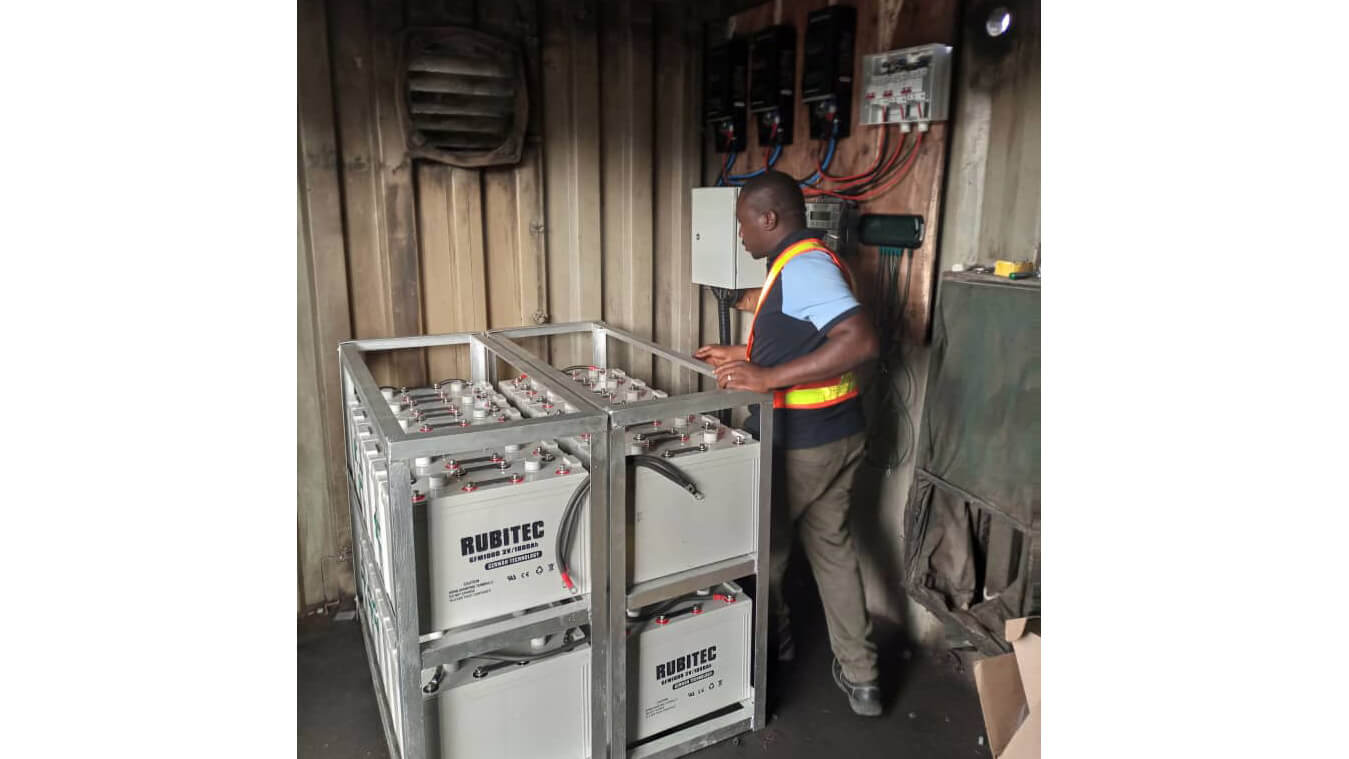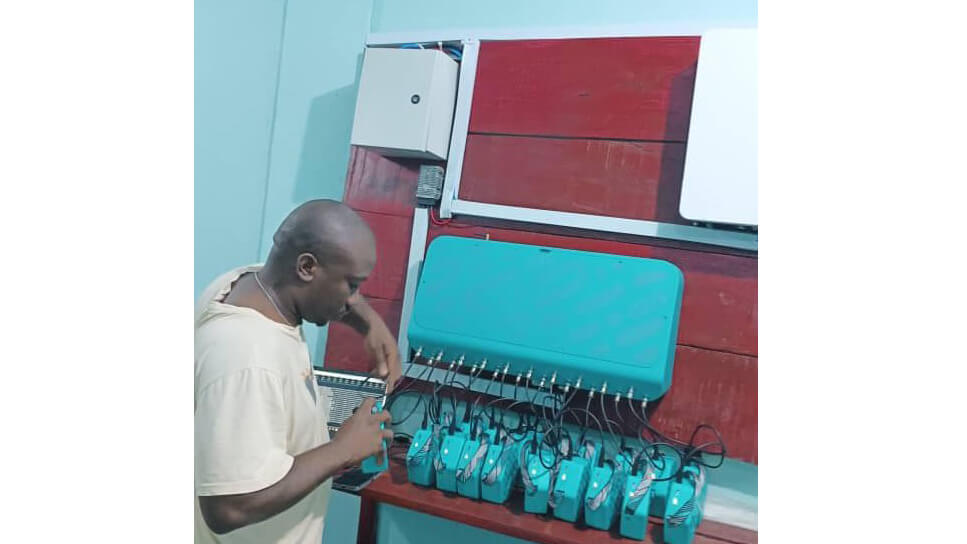UPDATED 1 Sept: The EI library in London is temporarily closed to the public, as a precautionary measure in light of the ongoing COVID-19 situation. The Knowledge Service will still be answering email queries via email , or via live chats during working hours (09:15-17:00 GMT). Our e-library is always open for members here: eLibrary , for full-text access to over 200 e-books and millions of articles. Thank you for your patience.
New Energy World™
New Energy World™ embraces the whole energy industry as it connects and converges to address the decarbonisation challenge. It covers progress being made across the industry, from the dynamics under way to reduce emissions in oil and gas, through improvements to the efficiency of energy conversion and use, to cutting-edge initiatives in renewable and low-carbon technologies.
Shining a Spotlight on Energy People: Justin Okafor AMEI
18/10/2023
6 min read
Comment
This Shining a Spotlight on Energy People interview delves into the background and experience of Energy Institute (EI) member Justin Okafor AMEI. A Technical Manager for Jaza Energy Nigeria, he shares his views on expanding energy access in rural Nigeria using renewable energy and battery storage.
Q: Tell us your background and when you first became interested in energy?
A: A young and brilliant student, I had to discontinue my secondary education because of financial constraints. Initially, I ventured into business; however, at age 17 I resolved to return to school. This time, I enrolled in a technical college with the goal of acquiring expertise in electrical installation and maintenance practices. My rationale was that even if I couldn’t complete the programme, I would possess the skills necessary to establish a career.
Fortunately, I completed the programme successfully and then pursued further education through a scholarship at the university, with a major in physics. During my internship, I was trained on inverter PCBA (printed circuit board assembly) repairs and battery storage system maintenance. I also visited the Su-Kam Power System factory in India for technical certification training on solar and energy storage systems.
However, the foundation of my passion for energy access was laid during my time at the technical college, where I acquired a strong understanding of the fundamental concepts and basics of electrical energy.
Q: Tell us a little about your current job?
A: I am the Technical Manager at Jaza Energy Nigeria, a startup with a mission to light up the African continent by establishing Jaza Solar Hubs and Jaza Packs, rooftop solar panels with custom lithium-ion batteries, in remote communities.
We also employ two females from each local community to manage the solar hub, helping to provide energy access to their own community through battery rental services.
My role involves the establishment and design of the solar hub, tailored to specific needs determined by the Jaza expansion team’s community survey. I also oversee the installation of equipment and the commissioning of the hub. I find great satisfaction in my work, as my passion for energy access and sustainability drives my dedication to this role.
 Lithium-ion batteries have a longer lifespan and charge faster than other battery types
Lithium-ion batteries have a longer lifespan and charge faster than other battery types
Photo: J Okafor
Q: How has being an Associate Member (AMEI) of the Energy Institute benefitted you in your career?
A: I have been an Associate Member for approximately three years. My current position was, in fact, made available to me through my membership with the Energy Institute. My mentor, Rose Atkinson, Search and Portfolio Manager at The Earthshot Prize, referred me to this job during our involvement in the EI Mentorship programme (EI Connect).
I am dedicated to consistently elevating the standards in my role to uphold the prestigious reputation of the Energy Institute. I regularly consult New Energy World and the EI site to stay updated on the latest trends in energy innovations, prepare myself for obtaining the energy management certification, and find more training to enable me to continuously contribute towards a just transition to net zero.
Q: How are your role and being part of the EI contributing toward a just transition to net zero?
A: By working for a renewable energy firm such as Jaza Energy Nigeria, primarily dedicated to delivering clean power to un-electrified communities, I am making a substantial contribution to the journey towards achieving a net zero carbon footprint. Bringing green energy to these underserved areas leaves little space for high-emission energy sources.
Q: What are the benefits of bringing solar panels and lithium-ion batteries to remote communities?
- Energy independence: solar panels and lithium-ion batteries can provide reliable, clean energy to remote communities, reducing their dependence on fossil fuels and the grid. This is especially beneficial in areas with frequent power outages.
- Reduced carbon footprint: solar panels generate clean energy that does not produce greenhouse gases.
- Long lifespan: lithium-ion batteries have a much longer lifespan than lead-acid batteries, making them a more cost-effective option in the long run.
- Efficient charging: lithium-ion batteries charge faster and are more efficient than other types of batteries.
By providing clean, reliable energy, solar panels and lithium-ion batteries can help improve the quality of life for people living in remote communities.

Jaza Packs are custom lithium-ion batteries that people in previously underserved communities can use to power anything from TVs to lights and mobile phones
Photo: J Okafor
Q: What are the main challenges you face in your role?
- Resource management: managing resources, including equipment, materials and personnel, to ensure that solar projects are executed efficiently and maintain the energy uptime target within budget can be a significant challenge.
- Technical complexities: dealing with the intricacies of solar energy systems, from design and installation to maintenance, can be challenging. So, I need to stay updated on the latest technological advancements and troubleshoot technical issues effectively.
- Environmental factors: solar energy systems are highly dependent on weather and environmental conditions. Managing energy production during cloudy days, addressing issues such as dust and debris on solar panels, and mitigating the impact of extreme weather events can be challenging. This is the main reason I have a keen interest in energy storage systems.
Q: How is the energy landscape in Nigeria, a major oil producer, changing? Do you see movement towards a clean, just energy transition?
A: The energy landscape in Nigeria has been experiencing several changes and discussions about a transition towards cleaner and more sustainable energy sources. Here are some key developments and trends in this context:
- Diversification of energy sources: Nigeria is gradually diversifying its energy sources beyond oil. While oil remains a significant contributor to the country’s energy mix, there has been an increased focus on renewable energy, such as solar, wind and hydropower. The Nigerian government has initiated projects and policies to promote these cleaner sources. For example, the Nigerian Electricity Regulatory Commission has developed regulations to encourage renewable energy investments and grid integration, and the Nigeria Electricity Management Services Agency is there to ensure compliance.
- Rural electrification: the lack of access to electricity in rural and remote areas of Nigeria is a persistent challenge. The government, in collaboration with private companies and international organisations, has been working on extending access to clean and affordable energy to these underserved communities. This includes initiatives like the Jaza energy solution.
- Challenges and inequities: despite these positive developments, challenges remain. The transition towards cleaner energy faces obstacles such as funding constraints, infrastructure deficits and the need for improvements in grid stability. Additionally, ensuring a just transition that benefits all citizens, including those in marginalised communities, is a complex endeavour.
- Climate change awareness: as global concerns about climate change and environmental sustainability grow, there is increasing pressure on Nigeria to address its carbon footprint and reduce greenhouse gas emissions. This has spurred discussions about cleaner energy alternatives. The government, private sector and civil society need to work collaboratively to address these challenges and ensure that the transition benefits the entire population while also contributing to global efforts to combat climate change.
Q: What needs to happen to bring clean energy to all the communities currently lacking power in Nigeria?
A: Nigeria has been taking steps to diversify its energy portfolio through increased investments in renewable energy sources such as solar, wind and biomass. The government has established specific targets for boosting the contribution of renewables to the nation’s overall energy mix. Given the difficulties in delivering reliable electricity to all citizens via centralised grids, there has been a growing emphasis on off-grid and mini-grid solutions, particularly in rural and isolated regions. Solar mini grids, in particular, have gained popularity.
Nonetheless, it is crucial to acknowledge that Nigeria still grapples with challenges in its transition to cleaner energy. These challenges encompass issues related to infrastructure, equitable energy access and the significant influence of the oil industry. The speed at which this transition unfolds will depend on a multitude of factors, including political determination and private investment.
Given the difficulties in delivering reliable electricity to all citizens via centralised grids, there has been a growing emphasis on off-grid and mini-grid solutions, particularly in rural and isolated regions.
Engaging communities in the planning and decision-making processes is vital. Local involvement and support increase the chances of successful and sustainable projects.
This is a key part of Jaza’s site selection criteria.
Training local technicians and entrepreneurs in the installation, maintenance and management of renewable energy systems creates job opportunities and ensures the long-term success of clean energy projects.
The views and opinions expressed in this article are strictly those of the author only and are not necessarily given or endorsed by or on behalf of the Energy Institute.
You can find more information about EI Membership and the Shining a Spotlight on Energy People series here.
